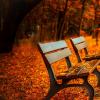
The last stanza of Psalm 94 gets back to where it started, with God as the Judge of all the earth (vv. 20-23). The corrupt judgment thrones of this earth cannot be allied with the upright throne of heaven. Thus, the psalmist looks for the day when the Judge of the earth will rise to destroy the wicked for their sins against the righteous.

Four things are promised to God's people in verses 12-15. Yesterday we looked at the first promise, relief from days of trouble. Today we examine three more.

In the meantime, the psalmist boldly warns the arrogant oppressors of this world whom he calls fools (vv. 8-11). He does it by a sharp series of rhetorical questions that remind us of Amos's questions in chapter 3 of his prophecy ("Do two walk together unless they have agreed to do so? Does a lion roar in the thicket when he has not prey?...When disaster comes to a city, has not the LORD caused it? [vv. 3, 4, 6]). Psalm 94 asks, “Does he who implanted the ear not hear? Does he who formed the eye not see? Does he who disciplines nations not punish? Does he who teaches man lack knowledge?”

The problem some people will have with these verses from Psalm 94 is that they use the word "vengeance,” and they do not like this word. The real problem for such people is that they do not distinguish between vengeance and revenge...The reason why vengeance belongs to God and not man is that in man our emotions usually cause it to degenerate into mere revenge. Vengeance is proper to God. It is a function of his perfect justice.

“There are times when the wicked seem to have things all their own way,” says Charles Haddon Spurgeon in a sermon on Psalm 94. That is never entirely the case, of course. The wicked have their troubles too, not the least of which are problems dealing with one another. But they do seem to prosper, and they certainly oppress those who are weaker than they are and take advantage of them. The earth is not a place for perfect justice.


















